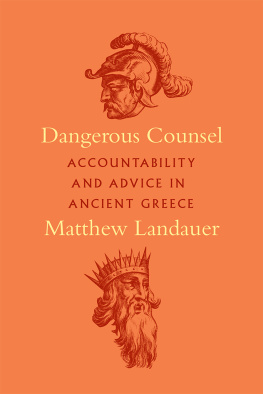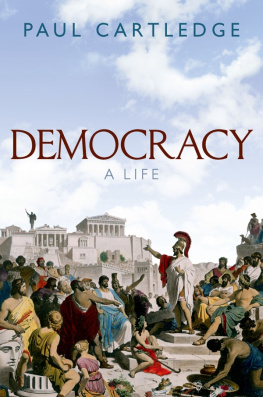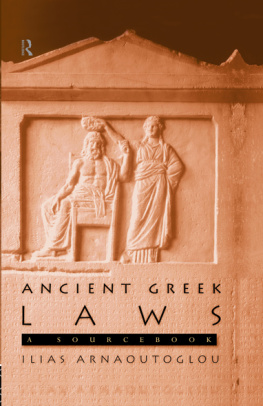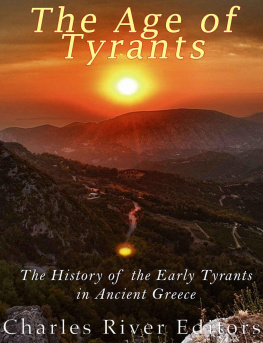
Death to Tyrants!
Death to Tyrants!
Ancient Greek Democracy and the Struggle against Tyranny
David A. Teegarden

Copyright 2014 by Princeton University Press
Published by Princeton University Press, 41 William Street, Princeton, New Jersey 08540
In the United Kingdom: Princeton University Press, 6 Oxford Street, Woodstock,
Oxfordshire OX20 1TW
press.princeton.edu
Jacket Art: Attic stammos. Harmodios and Aristogeiton murder the tyrant Hipparchos.
ca. 470 B.C., L 515 Martin von Wagner Museum, University of Wrzburg,
Germany. Photo: P. Neckermann.
All Rights Reserved
Library of Congress Cataloging-in-Publication Data
Teegarden, David Arlo, 1973
Death to tyrants! : ancient Greek democracy and the struggle against tyranny / David A.
Teegarden.
pages cm
Includes bibliographical references and index.
ISBN 978-0-691-15690-3 (hardcover : alk. paper) 1. Tyrannicide (Greek law) 2. GreeceHistoryAge of Tyrants, 7th6th centuries. I. Title.
KL4372.T44 2014
342.380854dc23 2013015337
British Library Cataloging-in-Publication Data is available
This book has been composed in Minion Pro and Myriad Pro
Printed on acid-free paper
Printed in the United States of America
10 9 8 7 6 5 4 3 2 1
For Paola
Contents
Illustrations
Figures
Tables
Preface
Twice in the past quarter century the world watched in amazement as popular uprisings in multiple countries suddenly overthrew seemingly stable authoritarian regimes. Enough time has now passed to conclude that the Eastern European revolutions of 1989 led to the establishment of genuine democracies in several states. The outcome of the (still ongoing) Arab Spring is yet to be determined. But the recent elections in Tunisia and Egypt provide democracy supporters some basis for cautious optimism. At the very least, authoritarianism is in retreat in that part of the world.
These uprisings provoked such widespread amazement because they are difficult to accomplish and thus surprising. This is somewhat ironic, of course: one would initially suppose that, if an overwhelming percentage of the population wanted to overthrow the ruling regime, they would do so. But that obviously is not the case. Authoritarian regimes know that, through intimidation and the control of publicly known information, they can prevent the people from acting together in numbers sufficient enough to pose any real threat. A few brave radicals might protest the regime; but the majority will stay silent out of fear, all the while hoping that their fellow citizens join in the protest. Thus despised regimes maintain their hold on power.
These modern-day examples from Europe and the Arab world suggest that the capacity to effect a large-scale popular uprising, although difficult, is virtually a necessary condition for combating tyranny and preserving democracy. If the majority cannot draw upon their collective strength and impose their will, elites will dominate the state with varying degrees of benevolence or (more likely) malevolence. If the masses learn to work together and take advantage of their numerical superiority, however, the tyrant is helpless. Thus all tyrannical regimes seek to hinder their citizens efforts to coordinate, while genuinely democratic regimes do the opposite. And history tells us that most often the anti-democratic forces win. But there are two conspicuous exceptions: the modern world and the ancient Greek world.
In this book, I demonstrate that the ancient Athenians invented, and the citizens of many Greek poleis subsequently adopted, an institution that facilitated large-scale, pro-democracy uprisings: tyrant-killing law. This peculiar law type essentially harnessed the dynamics of bandwagoning. It encouraged brave individuals to strike the first public blow against a nondemocratic regimeto kill a tyrantand convinced everybody else that, should he follow the tyrant killers lead, other individuals would follow. Thus, in the event of a coup, somebody would likely commit a conspicuous act of political defiance and thereby precipitate an ever-growing pro-democracy cascade. It was a simple, yet profound invention. And I will argue that it contributed to the success of democracy in the ancient Greek world.
Democracy ultimately represents a victory of the nonelite masses over the elite and powerful few. But the victory is not once and for all. I think it is safe to say that there always have been and always will be enemies of democracy: individuals and groups that seek to overthrow the people and hold the reigns of power themselves. The ancient Greeks learned how to combat those forces and thereby helped to ensure the success of democracy for several generationsthe worlds first democratic age. I suspect that the length and scope of our modern democratic age will likewise depend on how well pro-democrats learn to draw upon their collective strength and combat the modern tyrannical threats.
I received a lot of support during the years that I worked on this book. Josiah Obers advice and encouragement has been crucial; he oversaw this project when it was in its dissertation phase (Princeton 2007) and has been very helpful ever since. The Loeb Classical Library Foundation awarded me a generous fellowship so that I could devote the entire academic year of 201011 to research and writing. The Department of History at Cornell University kindly provided me a home for that year as a visiting scholar. At Cornell, I learned a lot about Greek history from my many conversations with Barry Strauss. The University at Buffalo generously granted me a leave for the academic year of 201011. My colleagues in the Department of Classics at UB have been very supportive; I would like to thank Martha Malamud in particular. The two anonymous readers of both Hesperia (which published in article form what is now ) and Princeton University Press provided many helpful suggestions for improvement. And finally, my wife Paola. I could not have written this book without her support, good humor, and sage advice. I dedicate it to her.
Abbreviations
ARV2 | J. D. Beazley, Attic Red-Figure Vase-Painters, 2nd ed. (Oxford: Clarendon, 1963). |
ATL | B. D. Meritt et al., Documents on the Athenian TributeLists, 4 vols. (Cambridge, Mass.: Harvard University Press, 193953). |
Austin | M. M. Austin, The Hellenistic World from Alexander to theRoman Conquest (Cambridge: Cambridge University Press, 1981). |
CIG | A. Boeckh, Corpus Inscriptionum Graecarum, 4 vols. (Berlin, 182877; repr., Hildesheim: Subsidia Epigraphica, 1977). |
DK | H. Diels and W. Kranz, Die Fragmente der Vorsokratiker, 6th ed., 3 vols. (Berlin: Weidmann, 1952). |
FGrH | F. Jacoby, Die Fragmente der griechischen Historiker, 15 vols. (Berlin: Weidmann and Brill, 192358). |
HD | Phillip Harding, From the End of the Peloponnesian War to the Battle of Ipsus (Cambridge: Cambridge University Press, 1985). |
I. Ephesos | H. Wankel et al., Die Inschriften von Ephesos, 8 vols. (Bonn: Habelt, 197984). |
|
Next page











